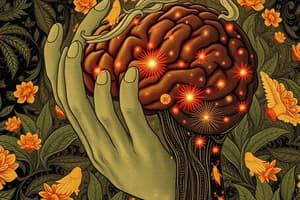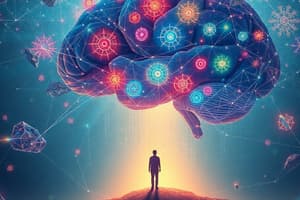Podcast
Questions and Answers
What is memory?
What is memory?
An active system that allows people to retain information over time
What does the Information-Processing Model state?
What does the Information-Processing Model state?
The ability to retain information over time involves three processes: Encoding, Storage, and Retrieval
What is encoding?
What is encoding?
The process of making mental representations of information so that it can be placed into our memories
What is storage in terms of memory?
What is storage in terms of memory?
What is retrieval?
What is retrieval?
What does the Three-stages Model of memory divide memory into?
What does the Three-stages Model of memory divide memory into?
What is sensory memory?
What is sensory memory?
What is short-term memory?
What is short-term memory?
What is long-term memory?
What is long-term memory?
What is iconic memory?
What is iconic memory?
What is echoic memory?
What is echoic memory?
What is working memory?
What is working memory?
What is maintenance rehearsal?
What is maintenance rehearsal?
What is interference in memory?
What is interference in memory?
What is chunking?
What is chunking?
What is the primacy effect?
What is the primacy effect?
What is the recency effect?
What is the recency effect?
What is the serial position effect?
What is the serial position effect?
What is declarative memory?
What is declarative memory?
What is explicit memory?
What is explicit memory?
What is semantic memory?
What is semantic memory?
What is episodic memory?
What is episodic memory?
What is procedural memory?
What is procedural memory?
What is implicit memory?
What is implicit memory?
What is amnesia?
What is amnesia?
What is automatic encoding?
What is automatic encoding?
What is effortful encoding?
What is effortful encoding?
Flashcards are hidden until you start studying
Study Notes
Memory Concepts
- Memory: An active system enabling retention of information over time.
- Information-Processing Model: Describes memory functions in three stages: Encoding, Storage, and Retrieval.
Memory Processes
- Encoding: Creation of mental representations for information, essential for memory formation.
- Storage: Long-term retention of encoded info, enabling recall at a later time.
- Retrieval: The act of accessing or recalling stored information.
Memory Models
- Three-Stages Model: Divides memory into sensory, short-term, and long-term categories.
- Sensory Memory: Brief retention of environmental stimuli in raw form; lasts from an instant to several seconds.
- Short-term Memory: Temporarily holds a limited amount of information (average 7 items) for 2 to 30 seconds.
- Long-term Memory: Capable of storing vast amounts of information for extended periods.
Types of Sensory Memory
- Iconic Memory: Visual sensory memory that holds images for about a quarter of a second before fading.
- Echoic Memory: Auditory sensory memory retaining sounds for 1 to 2 seconds.
Advanced Memory Concepts
- Working Memory: Active processing system integrating sensory info with long-term memory retrieval.
- Maintenance Rehearsal: Technique of repeating information to maintain it in short-term memory.
- Interference: Occurs when new information disrupts existing short-term memories.
Memory Techniques
- Chunking: Method of organizing information into larger units or "chunks" to aid memory.
- Primacy Effect: Enhanced recall of first items in a list.
- Recency Effect: Enhanced recall of last items in a list.
- Serial Position Effect: Tendency to remember items from the beginning and end of a list better than those in the middle.
Types of Declarative Memory
- Declarative Memory: Knowledge of facts and events; includes:
- Explicit Memory: Consciously accessible memory.
- Semantic Memory: Facts, concepts, and language knowledge.
- Episodic Memory: Personal experiences and specific events.
Types of Nondeclarative Memory
- Procedural Memory: Skills and tasks (e.g., riding a bike) learned through practice.
- Implicit Memory: Memories that are not consciously accessible.
Memory Disorders
- Amnesia: Loss of memory which can be temporary or permanent; results from brain injury, stress, or drugs.
- Automatic Encoding: Unconscious transfer of information into long-term memory.
- Effortful Encoding: Active effort required to transfer information, often through rehearsal or associations.
Studying That Suits You
Use AI to generate personalized quizzes and flashcards to suit your learning preferences.




